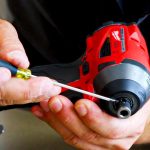An air compressor is a powerful tool that uses pressurized air to drive a wide range of equipment, from drills and sanders to paint sprayers and impact wrenches.
In short – “An air compressor is a critical tool for mechanics as it is used across different industries like construction, woodworking, and auto repair. And not to mention, compressed air is vital in achieving speedy and accurate results for tasks such as drilling, bolting, sanding, painting, and many others.”
In this article, we are going to discuss what air compressor is, their types, usage, and why air compressor is critical tools for any mechanic.
What Is Air Compressor?
Air compressors are pneumatic devices that pressurize atmospheric air and convert its potential energy into kinetic energy, which is stored in an air tank for later use. Apart from everyday items like refrigerators, air conditioners, and vehicle engines, air compressors find wide-ranging applications in construction, such as inflating tires, powering HVAC systems, air tools, and industrial systems. But one might ask, what is the critical part of a compressor? Well, well-functioning control air valves are crucial for air compressors as they regulate the amount of air required by opening and closing the inlet valve. If the inlet valve fails to open or close properly, it can cause a failure in the signal sent to the valves.
Types of Air Compressors
There are several types of air compressors available, each with its own unique characteristics, benefits, and drawbacks. Let’s take a closer look at the most common two types of air compressors.
- Positive Displacement Compressor.
- Dynamic Compressor.
1. Positive Displacement Compressor
Positive displacement air compressors work by trapping a specific amount of air in a compression chamber and then mechanically reducing the volume it occupies. As a result, the pressure increases before the air is discharged. These compressors use displacement to generate power by drawing outside air into their internal tank and slowly increasing the air pressure. And rotary screws and reciprocating compressors are the most common types of positive displacement compressors.
- Rotary Screw Compressor: Rotary screw compressors utilize an internal rotor system consisting of two rotating screws that move in opposite directions, which results in the compression of air between them, gradually increasing the pressure. They are commonly used in large-scale industrial operations, with some models requiring lubrication while others are oil-free. Due to their robust construction, they can handle continuous usage and are suitable for heavy-duty tasks.
- Reciprocating Compressor: Reciprocating compressors feature a piston inside a cylinder that compresses and displaces air to generate energy. They come in single-stage and multi-stage models, with single-stage compressors best for low-pressure needs and multi-stage compressors providing high-pressure and greater power capabilities. These compressors are ideal for small-scale projects like home renovations but are not meant for continuous use.
2. Dynamic Compressor
This type of air compressor generates horsepower by drawing in the air with rapidly rotating blades and restricting it to build pressure. Dynamic air compressors include centrifugal and axial machines and are used in very large manufacturing facilities. These units are beyond the scope of this document.
- Axial Compressor: Axial air compressors are typically utilized in high-performance vehicles, such as aircraft and ships, where there is a need for high-speed and efficient machinery.
- Centrifugal Compressor: Centrifugal compressors utilize a mechanism to slow and cool the air, which is then stored to create pressure. They are commonly employed in high-demand environments such as manufacturing and chemical plants, and despite their compact size, they can reach up to 1,000 horsepower.
What Size Compressor Do You Need?
When choosing an air compressor size, you need to consider two things: cubic feet per minute (CFM) and pounds per square inch (PSI). CFM refers to the speed of the air delivery, while PSI refers to the pressure level. You should choose an air compressor with a higher CFM and PSI than the tools you want to power with it.
First, make a list of all the air tools you want to use and add up their CFM requirements. Once you know the CFM you need, find an air compressor with a tank that can store enough air to power your tools. Smaller tanks are good for home use, while larger tanks are needed for industrial use
What Are The Uses of Air Compressors?
Air compressors are an important device in many industries, from construction to agriculture, food and beverage production, and automobile manufacturing. The versatility and multifunctionality are one of the many reasons why an air compressor is a critical tool for a mechanic. There are three different grades of air compressors commercial, contractor, and consumer air compressors. Each grade is designed for a specific purpose, with varying levels of power and capacity.

1. Uses of Commercial Air Compressor
Commercial-grade air compressors are often referred to as industrial air compressors. They are specifically designed to meet the high demands of construction sites and businesses, such as manufacturing and auto body shops. They are capable of producing and storing compressed air at much higher capacities than the other two grades of air compressors, making them the optimal choice for daily or intensive use. Here are some of the applications of commercial air compressors.
- Inflating Equipment: Commercial air compressors have various applications, such as inflating tires on construction equipment, including forklifts, scissor lifts, and loaders. Moreover, they can provide the power source for pneumatic tools such as jackhammers and nail guns. Even in automobile shops, you can inflate vehicle tires with this type of compressor.
- Powering Water Pumps and Gas Turbines: Air compressors are versatile machines used in various industries. In agriculture, they power water pumps for consistent delivery, ensuring adequate resources for crops and livestock. Additionally, compressors aid in gas turbine operation, where they pressurize air for combustion with fuel, generating power. Moreover, air compressors provide a reliable backup for emergency water pumping.
- Sandblasting: Sandblasters utilize compressed air as a crucial component to clean abrasive materials, such as stubborn rust on metal surfaces.
- Food and Beverage Industry: When it comes to the food and beverage industry’s packaging process, they are employed to vacuum-seal products, ensuring freshness, and preventing leakage or contamination.
2. Uses of Contractor Air Compressor
Contractor-grade air compressors are designed for professionals in the building industry, providing power to pneumatic tools such as nail guns. They are specifically built to meet the higher air demands required for these tools compared to consumer air compressors. Let’s explore the most common use of contractor air compressors.
- Carpentry: Woodworkers and carpenters often use pneumatic tools that are powered by air compressors in their woodshops to assist with the construction of cabinets and furniture.
- Renovation and Repair: Contractor-grade air compressors are versatile tools designed for professional builders, used in various areas of home construction, landscaping, and small-scale demolition. Additionally, they are also handy for roadside work, such as powering equipment like jackhammers to break up rocks and pavement, enabling road repair or construction.
3. Uses of Consumer Air Compressor
Consumer-grade air compressors are typically designed for household use, such as inflating sports equipment, tires, and various DIY projects. They are often portable and single-stage compressors. These are the common application of consumer air compressors.
- Powering Air Tools: Air tools are powered by compressed air and are widely used in commercial and construction sites as well as households. These tools include drills, nail guns, caulk guns, air hammers, impact wrenches, and others that require pneumatic air.
- Inflating (Bicycle Tires, Toys, Rafts, or Balls): Consumer-grade air compressors are capable of inflating bicycle tires, sports equipment such as basketballs, pool toys, and other inflatables like air mattresses.
- Spray Paint: Air compressors can be used for painting and staining, both indoors and outdoors, on a variety of surfaces such as buildings, decks, and fences. Compressors make the task easier by covering more area quickly and ensuring an even coat, especially when using spray painting equipment or applying stain.
Importance of Air compressors In Mechanic Work
Air compressors are an indispensable piece of equipment for mechanics, providing a wide range of benefits that make them a must-have tool in any garage or workshop. Here are some of the key reasons why air compressors are critical tools for any mechanic.
- High-Pressure Cleaning: Air compressors are useful for cleaning hard-to-reach areas, such as behind an engine block, without additional wiping or scrubbing. They can also help with vehicle cleaning and brake replacement jobs.
- High-Pressure Washing: Air compressors can make car washing easier with the high-pressure water force from the nozzle, making it more effective than traditional washing methods.
- Powering Pneumatic Tools: Air compressors power a wide range of tools, including air ratchets, sandblasters, paint sprayers, and more, which are commonly used in the automotive industry.
- Sandblasting: Air compressors are essential for removing rust and old paint from vehicles during the restoration process.
- Inflation: Air compressors are crucial in tire-inflating businesses, as they generate air pressure for inflating tires, improving productivity.
Frequently Asked Question
- What type of air compressor do mechanics use?
Automotive service, repair, and auto body shops usually depend on air compressors with 5 to 30 horsepower and air receivers ranging from 80 to 240 gallons to operate their pneumatic tools and equipment.
- Why is air compressor maintenance important?
A well-maintained air compressor can provide significant energy savings over its lifetime. And it also impacts the longevity of the tools it serves.
- Which type of compressor is best for the industry?
Axial compressors produce very high amounts of air, that’s why it’s the best for industrial applications.










Leave a Comment